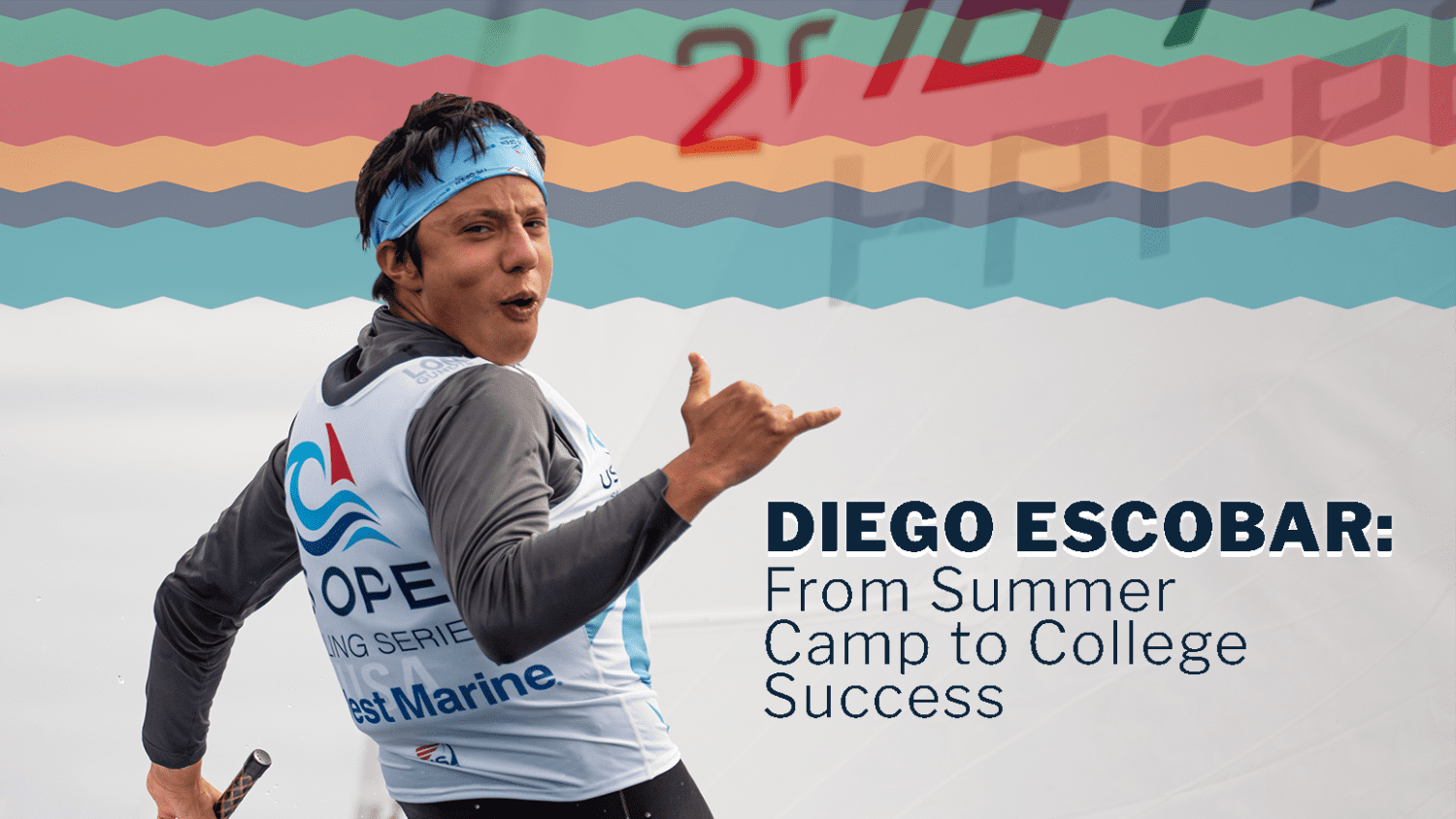US Sailing is celebrating Hispanic Heritage Month, from September 15 to October 15. The observation started in 1968 as Hispanic Heritage Week under President Lyndon Johnson and was expanded by President Ronald Reagan in 1988 to cover a 30-day period starting on September 15 and ending on October 15. It was enacted into law on August 17, 1988.
The day of September 15 is significant because it is the anniversary of independence for Latin American countries Costa Rica, El Salvador, Guatemala, Honduras and Nicaragua. In addition, Mexico and Chile celebrate their independence days on September 16 and September 18, respectively. Throughout the month, we will be bringing you stories from across US Sailing’s Hispanic community.
At the ripe age of 21, Diego Escobar has sailed multiple world championships, claimed high school national titles, and competed with the Olympic Development Program – but it didn’t start out that way, according to the San Diego transplant.
“I actually didn’t like sailing competitively very much back then,” remarked Escobar. “But by the time I won my first regatta, I was hooked.”
Escobar’s parents enrolled him in a summer sailing camp as soon as they moved to San Diego from their native Mexico City, when he was six or seven. Coming to a new country with a new language, they encouraged him to try several sports to help him adapt to his new hometown.
“They had me try everything from surfing to sailing,” said Escobar. “My dad put me into the sailing summer camp and said, ‘You’re sticking to this, just try it.’ Eventually I started to appreciate it more.”
From sailing camp to interscholastic sailing, Escobar continued to progress in his sailing journey while navigating the world as a first generation American and sailor. As a young kid, Escobar dove in headfirst, repeating a year in grade school to help him learn English.
Moving from Mexico to the United States was a large culture shock, according to Escobar. Thankfully, Escobar’s parents were also able to connect with other groups of emigrees from Mexico that helped him adapt to his new home.
“These friends are practically family to me,” he said. “While my direct family was away in Mexico City, they were there to support me at regattas, school plays, and holidays when I was growing up.”
At age 11, Escobar moved from sailing for fun to competing, where he realized sailing could be his lifelong sport. He competed for his high school, Point Loma, helping the team to qualify for numerous fleet racing, team racing and singlehanded national championships.
Escobar was part of the team that captured the Interscholastic Sailing Association’s Fleet Race National Championship in 2019 – results that propelled him to Georgetown, where he is now a member of their accomplished sailing team.
College sailing has been a welcome challenge for Escobar, who sees it as a chance to get hours on the water and foster a sense of community with his teammates.
“We have a unique opportunity to connect with people from all across the country on an interpersonal level that has resulted in some my best friendships,” he said. “While college sailing has a lot of ups and downs, I think it was still some of the most fun sailing I’ve done thus far. When else are you going to get to sail competitively with your best friends 4-5 days every week outside of the Olympic circuit?”
Outside of interscholastic sailing, Escobar took an interest in San Diego’s local Snipe fleet, eventually qualifying and competing in the 2019 World Championship and 2022 Junior World Championship. He and his sister, Ximena, qualified for the Junior World Championship in Portugal this past summer together, training as a family and a team.
“The highlights of that event were the international friendships we made off the water and battling hard to finish third in one of the windiest races, with six-foot swell, and seeing that Ximena and I were the only coed team in the top of the fleet,” Escobar recalls.
That community-centered nature, coupled with fierce competition, attracted Escobar to the class.
“What keeps me coming back to the Snipe is the multicultural makeup of the fleet, and in particular the popularity of the Snipe in Latin America,” Escobar remarked. “I truly enjoy getting to speak in my native tongue with other sailors and experience the sport I love with other people from a similar background.”
As far as his experience in the American sailing community, Escobar recalls a lack of diversity that was apparent from the start.
“My sister and I did a lot of sports growing up and sailing was by far the most lacking in diversity,” said Escobar. “It wasn’t until my participation in high school sailing, where traditional yacht club teams are foregone, did I see more diversity in the fleet.”
Escobar hopes to see more kids from outside the sport give sailing a try, like he was able to.
“I know sailing can be a very technical sport where it’s very hard to break in if you don’t know anyone,” he said. “But I think I’m a testament to the ability to come in if you have a passion for it, if you keep asking questions, and you stick with it.”

